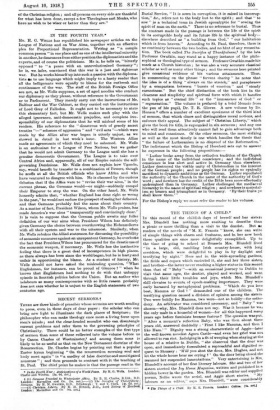RECENT SERMONS- t
THERE are three kindsof preacher whose sermons are worth sending to press, even in these days of dear paper : the scholar who can bring new light to illuminate the dark places of Scripture ; the philosopher who can make theology once more a living force upon men's minds ; and the clear-headed moralist who can disentangle current problems and refer them to the governing principles of Christianity. There could be no better examples of the first type of sermon than some of those collected into the volume before us by Canon Charles of Westminster,1 and among them none is likely to be so useful as that on the New Testament doctrine of the Resurrection. Dr. Charles begins by pointing out that a popular Easter hymn beginning "On the resurrection morning soul and body meet again" is "a medley of false doctrine andunmitigated nonsense " ; and then proceeds to contrast with it the teaching of St, Paul. The chief point he makes is that the passage read in the
• In the Fourth Year : Anlicipalions of a World Peace. By H. D. Wells. London : Chatto and Windua. [8s. Od. net./
t (1) Sermons Preached vi Westminster Abbey. By B. H. Charles, D.Litt., D.D. London : Macmillan and Co. (Si. net.i---(2) The Sacrifice ei Tharldidne M Sermons. By H. . Gwatkln, DI). Edinburgh : T. and T. Clark. Us. . net.] —(3) Christian Liberty. By H. B. Henson, P.D., Lord Bishop of Hereford. London : Macmillan and Ca. Fits. net4
Burial Service, "it is sown in corruption, it is raised in incorrup- Con," lc., refers not to the body but to the spirit ; and that " to sow" is a technical term in Jewish apocalyptic for "sowing the spirit of man on the earth." There is no reference to burial. Thus the contrast made in the passage is between the life of the spirit in its corruptible body and its future life in the spiritual body— elsewhere described as "a building from God," "our habitation which is from heaven." According to St. Paul, therefore, there is no continuity between the two bodies, and no hint of any resuscita- tion. The book called The Sacrifice of Thankfulness,' by the late Professor Gwatkin, may stand as a happy instance of the philo- sophical or theological type of sermon. Professor Gwatkin m.ade his mark as a Church historian ; he was also a very accurate classical scholar as well as many other things ; and the sermons here printed give occasional evidence of his various attainments. Thus, In commenting on the phrase "fervent charity" he notes that the idea is of a thing "always on the stretch," and paraphrases by a comparison between "bursts of emotion" and "steady earnestness." But the chief distinction of the book lies in the clearness and simplicity and spiritual force with which it handles such topics as "eternal life" or the "immanence of God" or "regeneration." The volume is prefaced by a brief Memoir from the pan of his pupil, Dr. T. R. Glover. A new volume by Dr. Henson a offers a number of excellent specimens of the third kind of sermon, that which clear" and distinguishes moral notions, and enforces their appeal. The subject of "Christian Liberty," which gives the book its title, is expounded in six sermons ; and any one who will read them attentively cannot fail to gain advantage both to mind and conscience. Of the other sermons, the most striking as well as the most timely is one which handles the thesis that "the failure of Lutheranism is no disproof of the Reformation." The indictment which the Bishop of Hereford sets out to answer he expresses in the following propositions :— " Luther broke away from the orthodox tradition of the Church in the name of the individual conscience ; and the individual conscience is less alert and active in Germany than elsewhere. Luther destroyed the visible unity of Christendom in the interest of the German people ; and no people has its rights so oynically sacrificed to dynastic ambitions as the German. Luther repudiated the authority of the Church in the name of the authority of God's word ; and nowhere has the credit of the Bible been more effectually undermined than in Germany. Luther ohallenged the mediaeval hierarchy in the name of spiritual religion ; and nowhere is material- ism so brazen and triumphant as in Germany. 'By their fruits ye shall know them.'" For the Bishop's reply we must refer the reader to his volume.


































 Previous page
Previous page